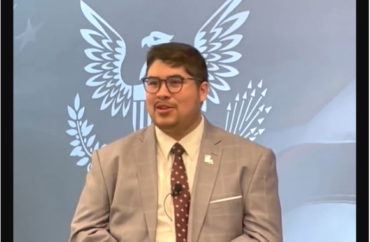
Student leader said he did it to show MIT administration ‘the tax they impose on marginalized communities’
Massachusetts Institute of Technology’s student government president has been removed from his position and faces a recall election due to his role in perpetrating two campus hate-crime hoaxes hanging posters and chalking slurs against LGBTQ people, Latinos and other “marginalized communities.”
Undergraduate Association President David Spicer helped hang the offensive posters and chalk the quad once in February and then again in mid-April during Campus Preview Weekend, infuriating his peers — even progressive ones who once championed him as a leader in campus diversity and inclusion.
Spicer has publicly admitted to — and defended — his role in the effort, arguing he did it to protest the university’s newly implemented wide-ranging policies in support of free speech.
“My decision to participate in the postering campaign was not one made lightly. I decided to join in the effort because I wanted, and still want, an MIT that supports students on the margin,” Spicer wrote in an April 27 op-ed in the student newspaper The Tech.
“When I opened Canva to make posters quoting pro-conversion therapy arguments, I was reminded of my time in the Texas conversion therapy center that my father sent me to. But whatever discomfort I felt, I knew it was also important to show that policy needs to change,” he wrote.
“While I know that President [Sally] Kornbluth probably has not had to deal with homophobia in her life, I have and probably will for the rest of my life. I want the MIT administration to know the tax they impose on marginalized communities.”
Prior to this controversy, Spicer was championed on campus as a leader in diversity, equity, inclusion and social justice, earning several high-profile awards and recognitions.
However, Spicer has “received a lot of heat for the issue and his popularity has gone through the floor since publishing [his op-ed],” a MIT student who asked to remain anonymous told The College Fix.
“I’ve spoken with students who are very liberal in their perspective on LGBT ideology, students who are pious Catholics who strongly oppose LGBT ideology, and students with perspectives in between. Every student I’ve spoken to about it agrees that Spicer’s actions were rash and inappropriate and that [his op-ed] fails to present an effective argument,” the student said via email.
According to the Tech, the student government said the poster campaign was “incredibly upsetting [and does] not align with UA values.” The student newspaper reported Spicer has been removed from his post and faces a recall election.
In an April 28 op-ed in the Tech, Alan Zhu, vice president of the Dormitory Council, called Spicer’s actions unacceptable.
“As a queer, non-binary student, I have seen these posters and felt a kind of hurt I have not felt since coming to MIT. As a student leader, I am furious,” Zhu wrote.
Zhu argued the newly implemented policies protecting free speech on campus could use improvement and clarity.
“But by engaging in vigilantism, rather than putting in the actual legwork of building consensus on the subject with his constituents and the administration, [Spicer] doomed his mission before it ever took off,” Zhu wrote.
“In fact, the amount of active harm Spicer has done in the process of trying to accomplish his goal massively outweighs any benefit which could have been gained by students. …This hate speech hurts our communities, and damages the very individuals the UA is meant to serve.”
Spicer’s efforts came after MIT faculty passed a resolution that defends freedom of speech and expression — even speech some find “offensive or injurious.”
As The College Fix previously reported, the offensive posters and chalkings were done to protest MIT’s emerging free speech policies.
“The chalking and flyers that carried slurs were put up as part of a much larger set of flyers, expressing a wide range of views, many framed in provocative terms. We have been told that these flyers were intended to probe the boundaries of MIT’s commitment to freedom of expression and to determine how this commitment comports with MIT policies, including those on harassment,” stated a memo from Dean for Student Life Suzy Nelson in February.
Nelson also addressed the issue in a statement April 19.
“As when similar flyers and chalkings were posted in February, these messages were part of a protest by some students against the Statement on Freedom of Expression and Academic Freedom, which the faculty approved, and its accompanying report,” Nelson stated.
“Protecting the right to free expression is extraordinarily important in an academic community; in that spirit, we are all free to express our own views on the statement and the report,” she stated, but added campus leaders have fast-tracked “a review of postering policies.”
MORE: LGBTQ slurs found at MIT done by students protesting school’s new pro-free speech efforts
IMAGE: Twitter screenshot






Please join the conversation about our stories on Facebook, Twitter, Instagram, Reddit, MeWe, Rumble, Gab, Minds and Gettr.